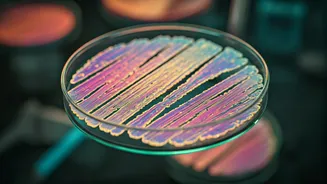Beyond Missing Microbes
Traditionally, the focus in gut health research has been on identifying specific microbes and their presence or absence in the gut. However, the new physics-based
model shifts the paradigm. Researchers are suggesting that the crucial factor in gut health is not just which microbes are there, but how these microbes engage with each other. This model views the gut microbiome as a complex ecosystem where the interactions between microorganisms, such as bacteria and viruses, govern the overall health. This approach could lead to more effective strategies for treating conditions associated with dysbiosis.
The Physics Framework
The innovative aspect of this research lies in its adoption of physics principles to understand the gut. The model examines the interactions between microbes using mathematical frameworks commonly employed to study physical systems. This means applying concepts like stability, dynamics, and equilibrium to the gut microbiome. Rather than focusing solely on the identity of the bacteria, the model focuses on how the behaviors of the microbial community, or their interactions, contribute to a stable and healthy gut. Such a perspective allows researchers to identify disruptions in the system that may lead to dysbiosis.
Dysbiosis Redefined
Dysbiosis, an imbalance in the gut microbiome associated with various health issues, is generally characterized by an alteration of the microbial composition. The new model proposes a different understanding. Dysbiosis, in this context, is thought to be more about the breakdown in how microbes interact within the gut ecosystem. This instability, which could be the consequence of various factors, can include environmental changes. The interactions become erratic. This altered state may affect essential functions like nutrient absorption, immune system modulation, and pathogen resistance, creating the potential for the onset of several chronic diseases.
Implications for Health
This new model offers promising implications for the development of innovative therapeutic approaches to gut health. By recognizing the importance of microbial interactions, researchers might move beyond focusing solely on the replacement of missing microbes. The emphasis could be placed on restoring the balance and harmony of interactions within the gut. Approaches might include introducing specific metabolites that encourage beneficial interactions, or designing interventions to stabilize the gut environment. Such novel strategies could lead to more efficient treatments for conditions associated with dysbiosis and improve overall gut health.












